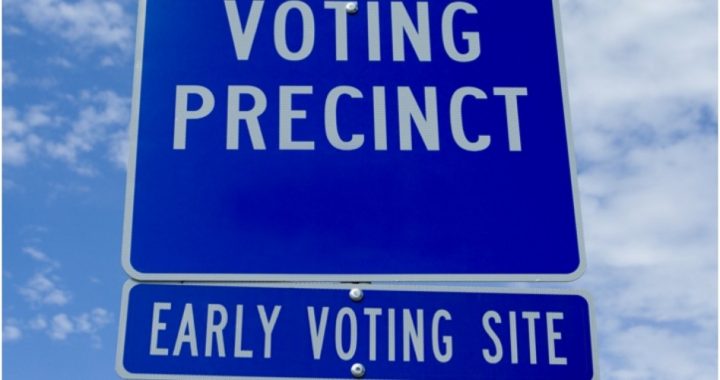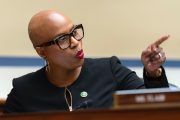
A determination from a federal judge in North Carolina on Friday marks a significant moment in the battle over voter ID laws in the United States and is all but certain to come before the Supreme Court. On Friday, Judge Thomas D. Schroeder of the Federal District Court rejected an effort by the NAACP and other civil rights groups and the Justice Department to block the application of a Republican-backed state voter ID law.
The New York Times writes of the North Carolina voting law:
The law, which was signed by Gov. Pat McCrory, a Republican, in 2013, will require voters to show a picture ID at the polls, but not until 2016. At issue in this case were changes already in effect, including the seven-day reduction of the state’s early-voting period; the elimination of a program that allowed for registration and voting on the same day during early voting; a ban on counting provisional ballots when voters cast them out of their home precinct; and a program that allowed 16- and 17-year-olds to “preregister” in anticipation of coming elections. The plaintiffs, including the state N.A.A.C.P., had argued that many of these provisions were particularly popular with black voters.
In his 125-page ruling, Judge Schroeder rejected the plaintiffs’ arguments that the law, said to be one of the toughest in the nation, would place “disproportionate burdens” on African-American voters who intend to participate in the upcoming elections. He noted that North Carolina’s history of racism does give “reason to be wary of changes in voting law,” but added that there are a number of ways in which black voters have opportunities to get to the polls, even with the reduced ballot access written into the law.
He cited, for example, the part of the law that reduces the period for early voting from 17 days to 10 days. He wrote that while witnesses opined that the change would impact the get-out-the-vote efforts, “no witnesses testified that he or she will not be able to adjust operations readily to fit the new early-voting period.” His decision ultimately declared that plaintiffs failed to prove that they were “likely to be irreparably harmed,” and thus did not require the injunction.
Penda Hair of the Advancement Project, one of the lawyers for the state NAACP, stated that her team has not yet decided whether to appeal the ruling, but that they plan to challenge the voter ID provision in a full trial, set for next July. “We are disappointed,” said Hair, “but we remain committed to prevailing on the trial on the merits.”
Bob Stephens, legal counsel to McCrory, asserted that the ruling proves once more that the law in question simply enacts “common-sense protections that preserve the sanctity of the voting booth.” He added, “Today’s ruling is just more evidence that this law is constitutional — as we have said from the very onset of this process.”
The decision marks an important victory for supporters of voter ID laws across the United States. According to the New York Times, a 2013 Supreme Court ruling paved the way for laws such as North Carolina’s because it invalidated a component of the 1965 Voting Rights Act that required federal approval before changes were made to election laws.
In Shelby County, Alabama v. Holder, Attorney General, Et Al, Chief Justice John G. Roberts Jr., writing for the majority, indicated that the nation had made progress in rooting out racial discrimination in voting and that current laws should represent the current climate. “Our country has changed,” Justice Roberts wrote. “While any racial discrimination in voting is too much, Congress must ensure that the legislation it passes to remedy that problem speaks to current conditions.”
He did add that Congress was permitted to make attempts to impose federal oversight in states where voting rights were at risk, but must utilize contemporary data in doing so. Analysts agreed that it would be rather difficult for Congress to reach a consensus on where federal oversight would be necessary.
North Carolina was not the only state to be emboldened by the Supreme Court ruling. Shortly after the decision, Texas announced that its voter identification law, which had been blocked previously, would immediately take effect.
Meanwhile, Judge Schroeder’s ruling may have guaranteed that these issues will be headed to the Supreme Court, since Judge Schroeder’s decision is at odds with another major ruling on the issue that came out of the Frank v. Walker case.
Richard Hasen, law professor and voting rights expert at the University of California, wrote of the two cases in a Friday blog post:
[Judge Schroeder’s] ruling is at odds with the other major ruling on the use of Section 2 in these vote denial cases, the Frank v. Walker case. That case was a voting rights plaintiffs lawyer’s dream, reading Section 2 of the VRA and the Constitution’s equal protection clause expansively to broadly protect voting rights….
Under the old Section 5 of the VRA, the question was one of “nonretrogression:” one compared the conditions for minority voters under an old law and a proposed new law. If the state could not demonstrate that the proposed new law did not make minority voters worse off, then the law could not be put into effect. Today, the judge in North Carolina said that section 2 did not include a similar nonretrogression standard. Thus, in deciding whether a cutback from 10 to 7 days of early voting violated Section 2 of the Act, the question was not whether 7 was worse than 10, but whether 7 days standing alone made it much harder for minority voters to participate in the political process on the same basis as other voters. The court held that there were still ample opportunities to vote under even the truncated dates, and especially in a midterm election where turnout is not expected to be a big problem. The court also seemed to require more proof of causation in the section 2 context than the Frank v. Walker court believed is necessary.
The Frank v. Walker ruling is currently on appeal in the Seventh Circuit, and Hasen contends that Judge Schroeder’s decision may well be appealed to the Fourth Circuit. Hasen predicts that eventually one of the cases will make it to the Supreme Court, and that the Supreme Court “would be more attracted to the narrow reading of Section 2 offered in [Schroeder’s] ruling compared to the broad ruling in Frank v. Walker.




